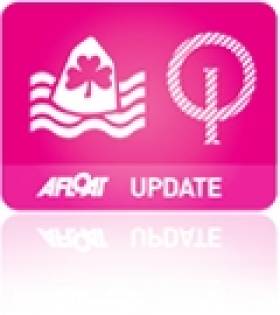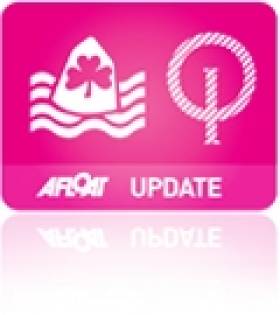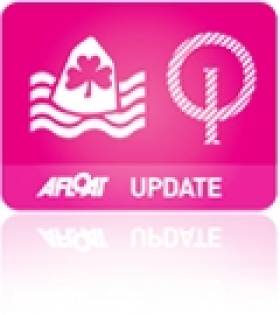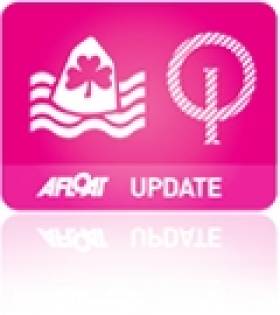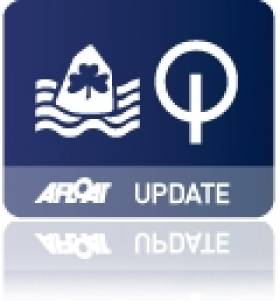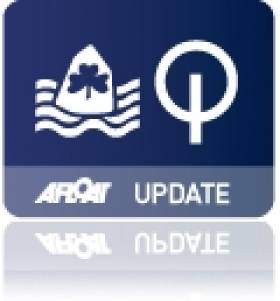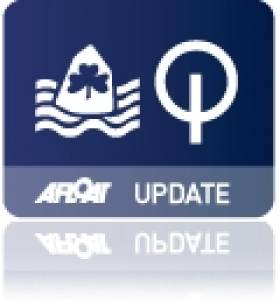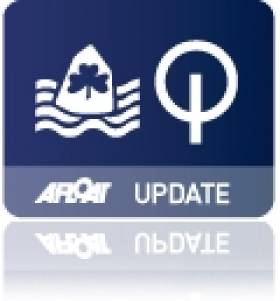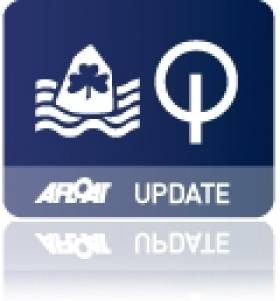Displaying items by tag: Optimist
Is Optimist Competition Pushing Kids Too Hard?
#opti – As Ireland prepares to welcome a record fleet of youngsters to the Optimist dinghy European Championships in Dun Laoghaire in four months time, Afloat.ie reader David Quinn questions the level of intensity of this winter's training and asks is this developing a life long love for sailing, or creating the environment where a tiny minority can push for Olympic Glory, while the rest take up another sport?
I live close to the Harbour in Howth, County Dublin so I tend to walk the pier or drive past the Yacht Club most weekends. This winter, much more than previous years, I have become really bothered and concerned at the extent of winter junior training sessions, particularly with the Optimist Class.
I started sailing relatively late so don't have much knowledge or experience of the Optimist Class. I started out in Mirrors before moving to Standard Rig Lasers. We trained hard, as an informal group, in Howth and competed internationally, but this was only in our late teens and early twenties. It is noticeable how many of my peers from that time are still sailing now and have a great love for the sport. I put that down to the huge fun we had racing Mirrors in Sutton Dinghy Club and at Regional events.
The major issues facing our sport are the fall off in memberships, declining activity and the lack of youth members in our clubs. I think a close scrutiny of the Optimist class would go some way to explaining some of the underlying problems in our sport!
I don't have an exact count, but the Optimists must have done at least four intensive training weekends, each with six hours of training per day. I'm not involved in the class so I can't be certain of the timing or intensity, but they seemed to launch before 10am and finish at dusk most days. I'm sure they came in for lunch. Is this developing a life long love for sailing, or creating the environment where a tiny minority can push for Olympic Glory, while the rest take up another sport?
I know some in the ISA are very concerned with this level of intensity for such young sailors, but the class, driven by over-ambitious parents, takes no notice. I doubt this is developing a life-long love for the sport, and I doubt it is even encouraging the kids to become elite sailors.
Maybe 1/100 will make it to senior international funded sailing? I would love to see a wider debate on the subject? I know when I was in my teens I sailed Mirrors and had a ball. It wasn't exactly an elite pathway class, but most of my peers from those days still race and sail very actively 25 years later. There must be a lesson there and it would make for an interesting study?
David Quinn (40) is a Laser and SB20 Sportsboat sailor from Howth Yacht Club and a former racing manager of the ISA.
Royal St.George Preparing for 'Record' Optimist Euro Champs
#opti – With just under four months left to the opening ceremony of the Optimist European Championships, the Royal Saint George Yacht Club in Dun Laoghaire is preparing itself for a record entry.
To date 43 countries have entered teams totalling 245 competitors and 80 coaches and team leaders.
In addition to the 32 European teams, we are delighted to be welcoming 11 international teams as far afield as Antigua, Australia, Bermuda, Brazil, Canada, Hong Kong, India, Japan, New Zealand, Singapore, and USA.
Irish Optimist Youth Sailing Season Already Underway
#optimist – Yesterday Optimist sailors in Cork and Dublin were packing a punch into training in Cork and Dublin writes Claire Bateman. Royal Cork YC members of the Irish Optimist Squad were training at Howth Yacht Club and other RCYC squad members were training in Cork Harbour where they presented a spectacular sight as they appeared to be literally flying up and down and around in a stiff W/SW bitingly cold breeze in the immediate vicinity of the club.
Next week Optimist training will move to Baltimore for the mid term schools break and sailors will spend the full week undergoing rigorous coaching and workouts. It also provides the opportunity for a mid term family break for other members of the families as they generally move to Baltimore for the week.
This is an extremely important year for the Optimist Class as the European Championships 2014 will take place in Dublin. A decision has been taken not to compete in the World Optimist Championships 2014 but to concentrate wholly on the European Championships. Obviously the venue is very accessible for the Irish sailors and will give some extra competitors the chance to participate where they might not have been able to access the Worlds at some far lung venue.
The Royal St. George Club will host the Europeans from July 12th to 20th, 2014 and credit for securing the event for the country must be given to Frank O'Beirne of RStGYC. This means that Ireland as the host nation will have fourteen places instead of the usual seven.
Following the Worlds, Optimist action will move on to the CH Marine Irish Optimist Nationals and Open Championship to be hosted by the Royal Cork Yacht Club from August 14th to 17th, 2014.
Royal Cork YC Launches CH Marine Optimist National Championships 2014
#optimist – The CH Marine Irish Optimist National and Open Championships 2014 preparations are well underway and the team at the Royal Cork Yacht Club are making plans for this exciting event due to be held in the Harbour in August. T
At the launch of the event Pat Lyons, Admiral welcomed the annoucement and commented that "the Royal Cork Yacht Club has a long tradition of hosting large sailing events and will be delighted to welcome the Optimist sailors to our Club. We are sure they will enjoy our facilities, our hospitality and top class race management".
Rob Foster, Optimist Class Captain commented that without a strong team of volunteers and sponsorship that we could not host such an event. He thanked CH Marine for their generous support. He also asked that all participants support the sponsors before, during and after the event.
Nick Bendon, Managing Director of CH Marine stated they were delighted to be associated with an event run by the Royal Cork Yacht Club and it's very large Optimist Class.
There will be a 4 day racing programme running from Thursday to Sunday (14th -17th August 2014). As with all IODAI events fleets will include Regatta, Junior and Senior.
The Royal Cork Yacht Club is keen to welcome not only Irish but international visitors and already has interest expressed by sailors from as far away as Monaco.
#opti – The Optimist fleet heads for Baltimore Sailing Club from Saturday the 15th until Friday the 21st of February with up to 161 children participating in a popular mid–term winter training programme.
The IODAI have 16 coaches, both international and Irish, catering for all levels from those just starting out in the regatta fleet right up to those on the national squad.
Families are catered for including mums and dads with a full social programme organised. If the weather turns there will be plenty of activities to alleviate hanging around, waiting for the right conditions. This year IODAI is introducing fitness screening facilitated by Sports Med Ireland which will include a lecture for parents. Sailing takes place from Sunday to Friday with a one day regatta on the final day.
Optimist Dinghy Vid Shows Youngsters Training in Big Waves off Cork Coast
#optimist – Young Optimist dinghy sailor Chris Bateman (12) from Cork Harbour has been making great use of recent training sessions and compiled recent winter sailing clips in to an 'extreme opti sailing' youtube video. Bateman (sail number 1443) and Tom Keal (1294) are seen 'ripping' upwind and down. Bateman enthuses about the massive waves, lots of wind and 'class sailing conditions' but admits its also been 'very cold'. Yes Chris, it looks it!
Optimist Class Seek Sailing Coaches for Busy 2014 Season
#optimist – The Optimist class is seeking three sailing coaches for international duty next season. Applications are sought for coaching IODAI Optimist Teams at International Events in 2014
1) Europeans 12-20th July 2014 (Dublin: Royal St George Yacht Club)
2) The international development team at the French nationals 12-20th July 2014 (An ability to communicate in French would be recommended)
3) Assistant Coach for U 12 squad to attend the British Nationals in Weymouth
In all cases the coach should be available four days before the event to possibly give the team additional training or in the case of the French nationals for possible travel with the boats. Also ideally the chosen coach would be available to coach at Baltimore 15th – 22nd Feb to become familiar with the children / parents & IODAI Committee.
For events 2 & 3 please indicate if you have a clean drivers licence.
Please forward your CV stating clearly which position you are applying for to [email protected] by December 15th 2013.
Optimist National Squad Announced for 2013/14
#optimist – The 2013/14 Irish Optimist Squad has been announced. The objective of the squad s to teach Irish junior sailors to train efficiently in their major sport, expose them to international racing, increase their experience and enjoyment of the sport and prepare them for the next stage of their sailing career.
The 2013/14 Optimist Squad:
Christopher Bateman
Amy Carroll
Michael Carroll
Peter Fagan
Caoimhe Foster
Clare Gorman
Ella Hemeryck
Daniel Hopkins
Max Kavanagh
Tom Keal
Sarah Levie
James McCann
Gemma McDowell
Micheal O Shuilleabhain
Grace O'Beirne
Cathal O'Regan
Loghlen Rickard
Calling All Optimist Dinghy Sailors! Malahide Yacht Club to Host Class Reunion
#opti – Beijing Olympian Ciara Peelo, a former Optimist sailor, is organising a reunion of Irish Optimist dinghy sailors young and old next month (October 12) at Malahide Yacht Club in North Dublin.
The idea is to get as many people from the 70s, 80s, 90s back together and catch up. This is aimed at anyone and everyone who sailed optimists during this time. 'As we were all quite young then and parents were a very important part of our Optimist sailing we are aware that many of our parents made great friends during our time sailing and we inviting any parents along too' says Peelo.
Malahide Yacht Club at St. James Terrace has undergone a major overhaul in the last couple of years and there is now a brand new clubhouse in the Broadmeadows and the club has offered the optimist gathering the use of the club Topaz dinghies in order to run a small regatta on the Saturday.
There will be a small cost of €20 to cover food on the night.
Please book by emailing [email protected]
Royal Cork Optimist Sailors Dominate Breezy Howth Leinster Championships
#opti – In a show of strength for Royal Cork Yacht Club youth sailing, the Munster club took the top three places in the Optimist Leinster Championships senior fleet and also won the junior fleet at this weekend's Leinster Championships at Howth Yacht Club.
Bitterly cold conditions, a confused sea, wind gusts of over 20 knots, and a rip-roaring tide made the young sailors value their warm sailing clothing at Howth Yacht Club.
With an attendance of 138 sailors it was certainly going to be some event and so it proved. There were 43 sailors in the Senior fleet, 55 in the Junior fleet and 40 in the Regatta fleet.
Excellent if difficult conditions prevailed yesterday. Wind on both days was westerly with a touch of North. Sailing yesterday started later than today with the result the fleets experienced an ebb tide in quite a long race. Today sailing was started earlier to give the sailors better racing with races somewhat shorter and the fleets sailed with a flood tide so all round excellent sailing conditions were experienced to test the sailors. Winds yesterday (Sat) were much stronger medium to fresh 15/16 knots with stronger gusts.
Conditions to day were somewhat lighter with 5/6knots of breeze and there were two black flag starts. Conditions yesterday were reported as being extremely cold with much warmer conditions today. Reports back from the sailors pronounced the racing as excellent with great sailing and all credit due to the race officials.
In the Senior Fleet the winner was Harry Durcan, RCYC, current National Champion, second James McCann RCYC and third Johnny Durcan, RCYC.
In the Junior fleet the winner was Chris Bateman, RCYC, followed by James McMahon HYC and Ella Hemeryck, NYC.
The Regatta fleet was won by Conor Gorman, NYC, followed by Hugh O'Connor, NYC with Ruth Lacy, HYC third.



























